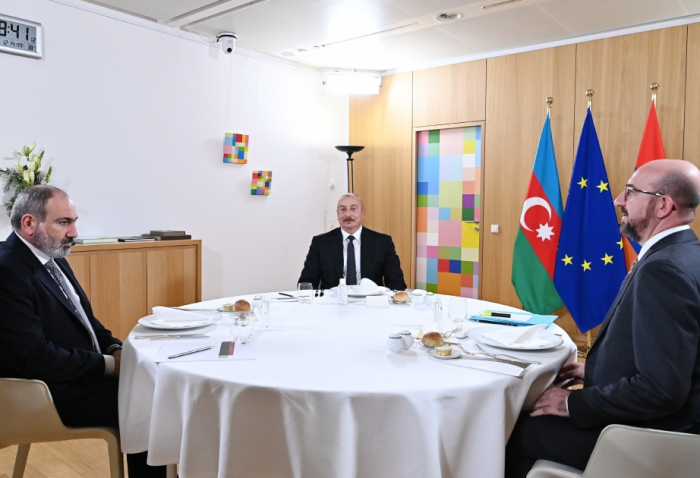The three countries of the South Caucasus (Armenia, Azerbaijan, and Georgia) are holding a vigilant and mostly balanced stance amidst the Russia-Ukraine war. The dangerous security situation in the wider region and Russia’s still strong political and military influence over the South Caucasus leave these countries few choices in this critical geopolitical upheaval. The region, along with the entire post-Soviet space, is pregnant to a different power balance in the wake of the ongoing war, although it is at the moment premature to say how different this balance and regional interstate politics will look after the war. One major issue to be affected by the outcomes of the current situation and, importantly, by the unprecedented confrontation between the West and Russia is the Armenia-Azerbaijan peace process.
The peace talks between Armenia and Azerbaijan prior to the Ukraine crisis had been maintained mostly through the mediation of Russia, but there was some coordination between Moscow and its Western partners in this process. Primarily the European Union (EU) and France sought to play a more active mediating role between the two Caucasian republics and organized two meetings of their leaders (one physical meeting in Brussels on December 14, 2021, and one online on February 4, 2022). This role of the Western actors appeared mostly as complementary to the Russia-mediated peace process and made an important contribution to the progress in the negotiations. Against this background, we witnessed a diminished role of the Minsk Group of the Organization for Security and Cooperation in Europe (OSCE), co-chaired by Russia, France and the United States and coordinated the Armenia-Azerbaijan negotiations prior to the 2020 Second Karabakh War.
The unprecedented low in the Russia-West relations caused by the Russia-Ukraine war cannot help but be reflected also in the Armenia-Azerbaijan peace process. One major implication of the present situation is related to the Minsk Group. It is now safe to say that this mission became part of history. This is so despite the fact that in recent years the former Armenia-Azerbaijan conflict used to be a rare case in which the approaches of the West and Russia overlapped. Although the two sides would have to come to the table for addressing some pressing international issues, a practical cooperation between them within the Minsk Group is highly unlikely to be possible in the near future.
Meanwhile, the need for the Minsk Group might disappear soon, if the existing positive trends between Armenia and its Turkic neighbors persist. Although the situation succumbed into violence and humanitarian tragedies in the European flank of the post-Soviet space in February, the Armenian-Azerbaijani peace process marked some promising developments which suggest that peace and reconciliation between the sides would be on the horizon.
On March 2, Armenia’s Prime Minister Nikol Pashinyan declared that launching negotiations on a peace treaty with Azerbaijan are on his government’s agenda along with other major issues including opening regional communications, delimitation and demarcation of the Armenia-Azerbaijan border. Importantly for regional peace efforts, both Armenia and Azerbaijan have confirmed their readiness to sign a peace treaty and putting an end to their enmity and hostilities. It is now plausible to expect that the sides may succeed to accomplish such a treaty recognizing their territorial integrity in the near future.
In early March, the Armenian government also announced the start of the work on the reconstruction of the Armenian section (43 km) of Yeraskh-Julfa-Ordubad-Meghri-Horadiz railway. The Minister of Territorial Administration and Infrastructure Gnel Sanosyan confirmed that Armenia allocated funds for geodetic work to start the construction works on this section. Following the Sochi and Brussels summits of the Armenian and Azerbaijani leaders, the first practical steps have been thus made by the Armenian side towards the realization of the railway linkage which Azerbaijan calls “Zangazur corridor”.
Some progress was also marked in the normalization process of the Armenia-Turkey relations. The Minister of Foreign Affairs of Armenia Ararat Mirzoyan positively assessed the second meeting of the Armenian and Turkish special representatives held on February 24 in Geneva and noted that the sides focused on more specific issues in these talks. Earlier Turkish President Recep Tayyip Erdogan positively talked about this process with Armenia and said his country could open its borders with its neighbor and reestablish diplomatic ties if Yerevan maintains a commitment to the ongoing normalization process between the two countries.
Thus, against the backdrop of the Russia-Ukraine war, Armenia and Azerbaijan look committed to overcome the challenges in their relations and realize the peace opportunities created after the Second Karabakh War. Although we might see little to no coordination between the West and Russia in the mediation of this process after the ongoing war, at this juncture this does not look likely to create big challenges for the Armenia-Azerbaijan peace process. In contrast, this offers a chance for Baku and Yerevan to promote bilateral contacts without any third-party mediation which would open a new and important chapter in the thirty-years old peace negotiations.
Vasif Huseynov is a Senior Advisor at the Baku-based Center of Analysis of International Relations (AIR Center)
More about: Azerbaijan Armenia Ukraine
















































